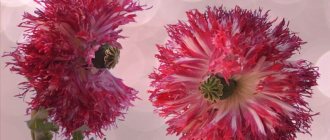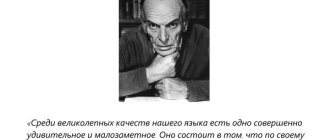In Ladimir Ivanovich Dal about the Russian language.
.
Is it possible to renounce one’s homeland and soil, from the basic principles and elements, trying to transfer the language from its natural root to someone else’s, in order to distort nature and it and turn it into a parasite living on someone else’s juices. There is no way to dispute the self-truth that a living folk language, preserving in the freshness of life the spirit that gives the language durability, strength, clarity, integrity and beauty, must serve. a treasury for the development of educated Russian speech, instead of our current language, kazhennik. . we must study the simple and direct Russian speech of the people and assimilate it to ourselves, just as all living things assimilate good food and transform it into their blood and flesh. . How correctly K. Aksakov captured, when examining verbs, the vital, living force of our language! Our verbs in no way succumb to the dead spirit of such a grammar, which wants to force them to subordinate them to only external signs; they require recognition of their independent, spiritual strength. its meaning and meaning.
. Language is the centuries-old work of an entire generation.
Monument to A.S. Pushkin and V.I. I give in Orenburg.
The language of the people is undoubtedly our most important and inexhaustible spring or mine, the treasury of our language.
If we begin to introduce Russian words gradually, at a place where they are clear in their very meaning, then they will not only understand us, but will even begin to adopt them from us.
We do not persecute with a general anathema all foreign words from the Russian language; we stand more for the Russian style and turn of phrase.
It seems as if such a revolution is now facing our native language. We begin to realize that we have been led into a slum, that we need to get out of it in a healthy way and pave a different path for ourselves. Everything that has been done hitherto, since the time of Peter the Great, in the spirit of distortion of language, all this, like an unsuccessful grafting, like a pin of heterogeneous seed, should dry out and fall off, giving room to the wildling, which needs to grow on its own roots, on its own juices, to be flavored with goodness. and care, and not a nozzle on top. If we say that the head is not waiting for the tail, then our head rushed so far somewhere to the side that it almost came off from the body; and if it is bad for shoulders without a head, then it is unselfish for a head without a body. Applying this to our language, it seems as if this head either has to come off completely and fall off, or come to its senses and come back. Russian speech faces one of two things: either it must be utterly destroyed, or, having come to its senses, it must turn to a different path, taking with it all the reserves abandoned in a hurry.
Source
Dahl Quotes
Prepared by: Dmitry Sirotkin
Compiled a selection of quotes from the linguist and writer Vladimir Ivanovich Dahl (1801-1872).
He is best known to us as the compiler of the famous “Explanatory Dictionary of the Living Great Russian Language,” which took 53 years of his life.
Quotes are divided into topics: language, life ethics, people, life, Russia, dictionary, about yourself, Russians, proverbs and sayings, learning, human manifestations, business, man, Orthodoxy, God, speaking.
About the language
The language of the people is undoubtedly our most important and inexhaustible spring.
Language is the centuries-old work of an entire generation.
The living folk language, which has preserved in the freshness of life the spirit that gives the language harmony, strength, clarity, integrity and beauty, should serve as a source and treasury for the development of educated Russian speech.
The language will not keep pace with education, will not meet modern needs, if it is not allowed to develop from its own juice and root, to ferment with its own yeast.
So we will reach the point where we will feed our native language with foreign juices.
The time has come to appreciate the people's language and develop an educated language out of it.
You can’t joke with language: a person’s verbal speech is a visible connection, a link between soul and body, spirit and flesh.
About life ethics
It is not enough glory to serve out of self-interest alone; No, serve under slander, under slander, with faith and truth, as they serve in Rus', out of sheer jealousy and honor.
Sometimes it is useful to repeat an old truth, especially if it is so easily forgotten. Love, don't fall in love, drink, don't get drunk, play, don't act out.
If the eternal, holy truths, which are vulgarized by dirty, unwashed lips; you are afraid of desecration of the shrine and bypass them; but they remain eternal and holy.
About the people
Neither nickname, nor religion, nor the very blood of ancestors makes a person a member of one or another nationality. Whoever thinks in what language belongs to that people.
Only kind and talented people can maintain majestic calm of spirit and humor in any, even the most difficult, circumstances.
If we look at the beliefs of the people, in general, as superstitions, then they no less deserve our attention, as a significant part of people’s life; these are fetters that a person has put on himself - either through his own fault, or out of necessity, out of great intelligence, or out of stupidity - but in which he must live and die if he cannot shake them off and be free.
Quotes Vladimir Ivanovich Dal
The study of Rus' from all sides, in all respects, in my opinion, should not be alien and shameful to the Russian.
He who sowed also reaped.
You can’t joke with language: a person’s verbal speech is a visible connection, a link between soul and body, spirit and flesh.
Neither nickname, nor religion, nor the very blood of ancestors makes a person a member of one or another nationality. The spirit, the soul of a person - this is where one must look for his belonging to one or another people. How can one determine the identity of a spirit? Of course, a manifestation of the spirit - thought. Whoever thinks in what language belongs to that people. I think in Russian.
Orthodoxy is a great blessing for Russia, despite the many superstitions of the Russian people. But all these superstitions are nothing more than the simple-minded babbling of a baby, still unreasonable, but with an angelic soul within him. As much as I know, there is none kinder than our Russian people and none more truthful, if only we treat them truthfully... Why is this? Because he is Orthodox... Believe me, Russia will perish only when Orthodoxy dries up in it.
Life is given for joy, but one must be able to defend it, therefore the true purpose of a person is the fight for truth and justice, the fight against everything that deprives people of joy. Any injustice seemed to me like daylight robbery, and I opposed it in every possible way.
White light is not the color of poppies: three bugs and a booger will not plague him.
The meaning of what I said about literacy is this: literacy in itself is not enlightenment, but only a means to achieving it; if it is used for something other than this, then it is harmful. Mental and moral education can be achieved to a considerable extent without literacy; on the contrary, literacy, without any mental and moral education and with the most unsuitable examples, almost always leads to bad things. Having made a person literate, you have aroused in him needs that you do not satisfy with anything, but leave him at a crossroads.
V.I.DAL ABOUT THE LIVING GREAT RUSSIAN LANGUAGE
By gathering under its wing not only the Slavs, but also everyone in need of protection and help, who wanted to serve faithfully, Russia thereby revealed, perhaps, its main calling - to unite peoples in love and brotherhood. True, the destined path was interrupted many times by tragic national upheavals. And yet, despite all the troubles and catastrophes that were not fully expressed by the forces of the people, Russia constantly radiated some kind of spiritual magnetism, which, like the gravity of the planet, drew into its orbit everything that was ready to interact with it.
In fairness, it must be admitted that the Italian Rastrelli, the Frenchman Falcone, the German Bryullov served Russia with dignity, Barclay de Tolly and Lermontov, who had Scottish ancestors, multiplied Russian glory, Karamzin had Tatar ancestors...
One could name a number of names of devotees of Russian science, culture, art, and generals, of whom we are still proud today, despite their non-Russian origin.
One of them is Vladimir Ivanovich Dal. “The spirit, the soul of a person - this is where we must look for his belonging to this or that people. How can you determine the identity of a spirit? Of course, by the manifestation of the spirit - by thought... Whoever thinks in what language belongs to that people. I think in Russian,” said V.I. Dahl.
Dahl's judgments are not indisputable, but the choice of criteria for belonging to a particular people - spirit, soul, language - attracts attention. Thinking in Russian, Dahl, a Dane by origin, understood and could convey in artistic form many of the spiritual subtleties of the Russian person, which allowed him to be known not only as an expert on the Russian national character, but also to become a fairly famous writer of his time.
Vladimir Ivanovich Dal
(pseudonym Kazak Lugansky)
Russian lexicographer, ethnographer, writer, poet, playwright. Creator of the famous “Explanatory Dictionary of the Living Great Russian Language” in four volumes, author of the collection “Proverbs of the Russian People”. “Russian Fairy Tales”, “There Were and Fables” were published in the adaptation of V. Dahl. V. Dahl is the author of the ethnographic and physiological essays “Gypsy Woman”, “Petersburg Janitor”, “Batman”; stories “Pavel Alekseevich Igrivy”, “Belovik”, etc.
The teacher himself must be what he wants the student to be.
Every lie or mistake corrupts the mind and heart.
Our life has long been compared to a difficult, uneven, thorny path - not everyone is destined to walk along it at a time of year when, at least, the thorns are fragrant with their white sweat...
If the work of a person’s entire life is disgraced by one frivolously thrown word, then there would be no point in responding to this; but if this word contains a direct accusation, then one must answer it and answer not for the sake of one’s personality, but for the sake of the cause.
A language that has its own grammar should be recognized as independent in development and circulation; for an adverb - a slight deviation from it, without its own grammar and writing; for speaking - an even less significant deviation, relating more to the peculiarities of pronunciation and melody, according to the proverb: what is a city, so is its temper; what is a village, so is its custom; what is a courtyard, so is its dialect.
Just as rubles are made from kopecks, knowledge is made from grains of what you read.
It is not enough glory to serve out of self-interest alone; no... serve... under slander, under slander, with faith and truth, as they serve in Rus', out of sheer jealousy and honor.
Is it possible to renounce one’s homeland and soil, from the basic principles and elements, trying to transfer one’s language from its natural root to a foreign one, in order to distort its nature and turn it into a parasitic plant, living on alien juices?
Our folk words can be directly transferred into the written language, never offending it with a gross mistake against itself, but, on the contrary, always directing it into its natural rut...
The vernacular language is strong, fresh, rich, concise and clear...
Neither vocation, nor religion, nor the very blood of ancestors makes a person belong to one or another nationality. The spirit, the soul of a person - this is where one must look for his belonging to one or another people. How can one determine the identity of a spirit? Of course, a manifestation of the spirit - thought. Whoever thinks in what language belongs to that people.
But you cannot joke with language, with human words, with speech, with impunity; verbal speech of a person is a visible, tangible connection, a union link between body and spirit: without words there is no conscious thought.
A sweat penny protects a person forever, but what he has acquired unjustly is of no use: as what comes, so goes...
Russian speech faces one of two things: either it must be utterly destroyed, or, having come to its senses, it must turn to a different path, taking with it all the reserves abandoned in a hurry. Look at Derzhavin, at Karamzin, at Zhukovsky, at Pushkin and at some of today's gifted writers, isn't it clear that they avoided the talk of others; that they tried, each in their own way, to write in pure Russian?
Socialists and communists, in the spirit of their teaching, are contracted enemies of any state order.
Language is the centuries-old work of an entire generation.
The language of the people is undoubtedly our most important and inexhaustible spring or mine, the treasury of our language, which, in writing, has deviated far from what it should have been.
Source
LiveInternetLiveInternet
Quote from Tomaovsyanka's message
Read in full In your quotation book or community!
November 22, 1801, Vladimir Ivanovich Dal, compiler of the “Explanatory Dictionary of the Living Great Russian Language,” was born.
November 22, Vladimir Dal’s birthday, is Dictionary Day in Russia, which has already become a traditional holiday of Russian literature. On this day, numerous events are held in Russian schools dedicated to Vladimir Dahl as a symbol of Russian lexicography, and to the formation and development of a culture of using dictionaries.
In his mature years, the “word hunter,” as he called himself, had a patriarchal appearance
The creator of the largest and most famous dictionary of the Russian language was not an armchair scientist, but lived a varied and eventful life: he changed his profession three times, traveled, fought, was friends with celebrities, suffered for freethinking and rose to the rank of “excellency.”
A connoisseur and connoisseur of the Russian word, he is Danish on his father’s side and German on his mother’s side, but he visited Copenhagen only once, and, in his words, “I was finally convinced that my fatherland is Russia, that I have nothing in common with the fatherland of my ancestors.” At the same time, he remained a Lutheran all his life and converted to Orthodoxy a year before his death.
Dahl began the main work of his life only at the age of 58, having retired and settled in Moscow, and before that he was a naval officer, doctor and official, and was engaged in philology and literature as a hobby.
A number of remarkable facts from the life of a remarkable scientist:
The parents of the future scientist were highly educated people and polyglots. My father worked as a government doctor in Lugansk and Nikolaev. Vladimir Dal loved the lush Ukrainian nature and published under the pseudonym “Cossack Lugansky”.
- Dahl became interested in collecting words at the age of 18 and did not leave this activity for 53 years. The first thing in his notebook was what he heard from the coachman: “it’s rejuvenating” - “it’s getting colder,” “it’s leaning toward bad weather.”
- During the Russian-Turkish War of 1828-29, in which Dahl participated as a regimental surgeon, the Turks captured a pack camel with its luggage and notes. The soldiers, seeing the doctor’s distress, recaptured the valuable cargo. Many years later, having retired and settled in Moscow, he told his family: “If there is a fire, take out my boxes first!”
- Dahl graduated from the Naval Corps in the same class as Pavel Nakhimov, but did not serve long: firstly, as it turned out on his first voyage, he suffered from incurable seasickness, and secondly, he composed an epigram on the commander of the Black Sea Fleet, Alexei Greig, which made the whole of Odessa laugh: the admiral In his old age, he brought the daughter of a local innkeeper closer to him.
Dahl the surgeon was especially famous for his skill in removing ocular cataracts . Once he had to amputate the arm of a certain retired major Sokolov. The young doctor met the patient's daughter and eventually became his son-in-law.
Known to every Russian since childhood, “Ryaba the Hen” was recorded and published by Dahl.
- In 1832, Dahl published a collection of Russian fairy tales. The chief of staff of the gendarme corps, Alexander Mordvinov, reported to Nicholas I: “The book was printed in the simplest style, adapted for the lower classes. It contains ridicule of the government, complaints about the sad situation of the soldier, and so on.” Dal was arrested and then released thanks to the intercession of the poet Vasily Zhukovsky, who served as educator of the heir to the throne.
- The collection's circulation was withdrawn, which immediately made Dahl a celebrity. “His fame quickly spread thanks to this ban,” recalled academic philologist Yakov Grot.
- Dahl was friends with Pushkin (who ardently supported the idea of creating a dictionary) and was present at the death of the poet.
- Pushkin was especially amused when he heard from Dahl the popular word “vypolzina” (shed snake skin), which he used to call his tight-fitting frock coats.
- Under the patronage of Pushkin, Dal received the position of official for special assignments under the poet’s acquaintance, the Orenburg governor Vasily Perovsky.
Orenburg icon of the 1870s with the image of St. Cosmas and Damian. Pushkin and Dahl served as prototypes of the saints
- While collecting materials on the history of the Pugachev rebellion, Dahl traveled along the impassable roads of Russia with his friend Alexander Pushkin. And later, in the mournful dying minutes of 1837, Vladimir Ivanovich was next to the poet, receiving a talisman ring from the hands of a dying man.
- In 1841, Perovsky was appointed Minister of the Interior, and he took the efficient official to St. Petersburg. Working as an assistant to the minister, Dahl used his official position: he forced provincial officials to send him local expressions and proverbs.
- Young Ivan Turgenev worked in the Ministry of Internal Affairs under Dahl and resigned after he scolded him for systematically being late in the morning. Subsequently, the author of “Fathers and Sons” admitted that he served “faultily,” and spoke of Dal as follows: “Precise, inexorably strict, he knows a Russian person like his own pocket.”
- In 1866, after seven years of work, the first edition of the dictionary, containing 2,485 pages, was published. The Academy of Sciences awarded Dahl the Lomonosov Prize and elected him as an honorary member.
- The large explanatory dictionary of 1998 contains 130 thousand words, Ushakov’s dictionary 90 thousand, Ozhegov’s dictionary 50 thousand. Vladimir Dahl's explanatory dictionary of the living Great Russian language includes about 200 thousand words and 30 thousand sayings and riddles that demonstrate their meaning. True, from the point of view of a modern user, it is overloaded with dialectisms and archaisms and does not contain many relevant words that have appeared over the past hundred and fifty years.
- In addition to purely linguistic information, the dictionary provides a huge amount of information about folk life, traditions and crafts. For example, the article “bast shoes” describes in detail all the typical types of bast shoes and methods for making them.
- A week before his death, Vladimir Dal asked his daughter to write down another “little word” she heard from the servants
Artem Krechetnikov. BBC Russian Service, Moscow
“After Gogol, this is still absolutely the first talent in Russian literature,” Belinsky spoke of him.
In the last years of his life, Dahl worked on the second edition of his Dictionary. Inspired by a religious-mystical mood, he transcribed the Old Testament “in relation to the concepts of the Russian common people.”
In addition, he wrote textbooks on zoology and botany, played several musical instruments, worked on a lathe, and studied homeopathy.
“Whatever Dahl undertook, he managed to master everything,” wrote his friend, the great surgeon Pirogov. Shortly before his death, Vladimir Ivanovich converted from Lutheranism to Orthodoxy.
More: The most unusual words from the dictionary of Vladimir Ivanovich Dahl
Series of messages “Native Speech”:
Series of messages “Book”:






